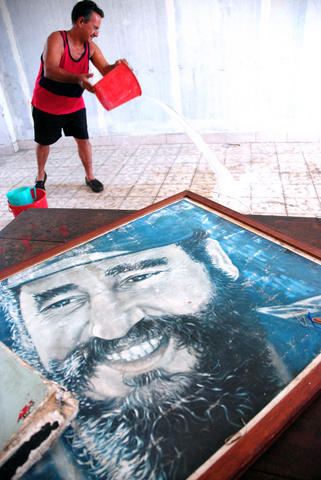Cuban President Fidel Castro hasn't been seen in public for nearly 18 months and says he is too sick to campaign. But that still hasn't stopped the 81-year-old from standing for re-election in parliamentary elections yesterday.
Some 8.4 million voters are being asked to back Castro and 613 other top Communists, career politicians, musicians and athletes for posts in the island's rubber-stamp legislature, known as the National Assembly.
Castro, Cuba's unchallenged "Maximum Leader" since 1959, ceded power to his younger brother Raul following emergency intestinal surgeries in July 2006 and is still recovering from an undisclosed illness at a secret location.

PHOTO: AFP
Although he no longer runs the government, Castro still heads of its supreme governing body, the Council of State, and his re-election to parliament is necessary to retain that position.
Following the vote, lawmakers have 45 days to choose among their colleagues for a new Council of State, meaning a decision on whether Castro will remain president or permanently retire could come by March.
Voters at district polling places overseen by schoolchildren are given a list of candidates -- just one per post. They are encouraged to check a single box supporting the full slate, although if they object to some candidates, they can mark individual boxes by names they support and leave others blank.
Candidates who don't get more than 50 percent of the vote lose, although National Assembly officials don't remember that happening since Cubans began voting for their parliament in 1993.
Cuba now elects a new parliament every five years, and while organized campaigning is forbidden, candidates are encouraged to interact with district voters and their resumes are posted at the polls. The Communist Party is the only party allowed.
Preliminary returns should be ready quickly, as electoral officials use ham radios or even carrier pigeons to report results from isolated mountains and corners of the countryside after polls close.
Castro, who has been penning essays for publication in state newspapers, wrote last month that he has no intention of clinging to power or standing in the way of a new generation of leaders. But he also praised the example of a celebrated Brazilian architect who is still working at 100.
"I am not physically able to speak directly to the citizens of the municipality where I was nominated for our elections," he wrote on Wednesday.
"I do what I can: I write," he added, seeming frustrated. "Writing is not the same as speaking."
The government said more than 95 percent of voters were to participate in yesterday's vote, but the US government dismisses the process as a sham.
"These elections are not a break with past practice in Cuba and do not represent a real opportunity for the Cuban people to decide for themselves how they will be governed and who will govern them," said Kurtis Cooper, a State Department spokesman, in Washington on Friday.

People with missing teeth might be able to grow new ones, said Japanese dentists, who are testing a pioneering drug they hope will offer an alternative to dentures and implants. Unlike reptiles and fish, which usually replace their fangs on a regular basis, it is widely accepted that humans and most other mammals only grow two sets of teeth. However, hidden underneath our gums are the dormant buds of a third generation, said Katsu Takahashi, head of oral surgery at the Medical Research Institute Kitano Hospital in Osaka, Japan. His team launched clinical trials at Kyoto University Hospital in October, administering an experimental

IVY LEAGUE GRADUATE: Suspect Luigi Nicholas Mangione, whose grandfather was a self-made real-estate developer and philanthropist, had a life of privilege The man charged with murder in the killing of the CEO of UnitedHealthcare made it clear he was not going to make things easy on authorities, shouting unintelligibly and writhing in the grip of sheriff’s deputies as he was led into court and then objecting to being brought to New York to face trial. The displays of resistance on Tuesday were not expected to significantly delay legal proceedings for Luigi Nicholas Mangione, who was charged in last week’s Manhattan killing of Brian Thompson, the leader of the US’ largest medical insurance company. Little new information has come out about motivation,

‘MONSTROUS CRIME’: The killings were overseen by a powerful gang leader who was convinced his son’s illness was caused by voodoo practitioners, a civil organization said Nearly 200 people in Haiti were killed in brutal weekend violence reportedly orchestrated against voodoo practitioners, with the government on Monday condemning a massacre of “unbearable cruelty.” The killings in the capital, Port-au-Prince, were overseen by a powerful gang leader convinced that his son’s illness was caused by followers of the religion, the civil organization the Committee for Peace and Development (CPD) said. It was the latest act of extreme violence by powerful gangs that control most of the capital in the impoverished Caribbean country mired for decades in political instability, natural disasters and other woes. “He decided to cruelly punish all

NOTORIOUS JAIL: Even from a distance, prisoners maimed by torture, weakened by illness and emaciated by hunger, could be distinguished Armed men broke the bolts on the cell and the prisoners crept out: haggard, bewildered and scarcely believing that their years of torment in Syria’s most brutal jail were over. “What has happened?” asked one prisoner after another. “You are free, come out. It is over,” cried the voice of a man filming them on his telephone. “Bashar has gone. We have crushed him.” The dramatic liberation of Saydnaya prison came hours after rebels took the nearby capital, Damascus, having sent former Syrian president Bashar al-Assad fleeing after more than 13 years of civil war. In the video, dozens of